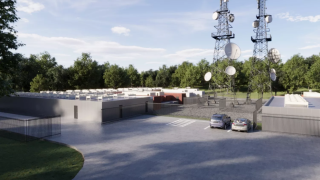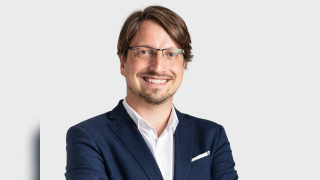|
|
Just over five years ago, an ambitious start-up telecoms operator first launched its services in the UAE. The odds were thoroughly stacked against the company; its founding shareholders had no prior experience in the telecoms sector and the local incumbent had a mobile service penetration of over 100%. “Those early days at du were incredibly exciting and incredibly hard work,” says Andrew Grenville, EVP of investments (special projects). “A lot of people thought we were crazy.” Today, du serves over four million customers in a country with a population of approximately six million. It also offers fixed, broadband and IPTV services and employs nearly 2,000 members of staff. Grenville, however, only pauses very momentarily to reflect on du’s achievements so far, before his mind switches back to the challenge in hand: transforming the UAE into an ICT hub for the Middle East region.
From tourism and retail through to finance and business, the UAE and in particular Dubai has continuously succeeded in becoming a regional hub for a large number of industries, although telecoms remains a notable exception. “We have wanted to replicate that success in telecoms which will not only radically improve the experience for our customers here but also in the wide Middle East region,” says Grenville. “Our efforts have paid off significantly.”
Grenville has identified a number of fundamental problems hampering the development of internet in the Middle East. One quick example, however, highlights the root of the problem: “If I am in Dubai and I want to access content in Jordan, it is quite likely my request will go to a server in London which will send the request on to a server in Jordan. The Jordan server will then send the information back via London,” says Grenville. “We are relying too heavily on international links and there is a latency issue – this can lead to poor customer experience.”
The vast majority of content consumed in the Middle East is US and European centric, with Grenville estimating that 80-90% of content in the region is still long-lined. Essentially the regional operators and ISPs are unable to deliver a good quality of service to customers, while the content owners are left frustrated by the poor customer experience on their websites. With the Middle East becoming one of the fastest growing regions in the world for internet usage, the problem is likely to only intensify. The solution, Grenville believes, is obvious: “exchange and facilitate retention of that content here in the region itself.”
Progress report
Before joining du, Grenville previously worked in both London and Singapore; two cities widely recognised as successful telecoms and ICT hubs. From his experiences of working in each, Grenville has developed a deep understanding of the common components required to establish an ICT hub – which he believes can be eventually established in the UAE. “When I arrived in Dubai from Singapore five years ago, I was quite amazed at the number of parallels between both cities. Many of the things Singapore has successfully implemented, Dubai and Abu Dhabi are doing as well – but there is some catching up to do before the UAE can be in as strong an ICT position as Singapore,” says Grenville.
One of the first areas Grenville has identified that the Middle East region needs to address is basic infrastructure. “There needs to be a good supply of capacity into the region, typically through submarine cables or possibly terrestrial cables too, in order to balance supply and demand. That’s not currently the case in the Middle East, but it’s changing fast,” says Grenville.
du recently invested $50 million in the Europe India Gateway (EIG) cable, which was partially activated in February and is connected to the company’s landing station in the emirate of Fujairah. Later this year, the Gulf Bridge International (GBI) cable will also go live, connecting the GCC through 4,750km of cable configured as a ‘self-healing’ ring in the Gulf. “The region is experiencing a significant change in the submarine cable landscape and that is welcomed by everybody. No question that it will significantly increase capacity and drive down prices – the connectivity issue is being resolved,” says Grenville.
One area, however, that Grenville believes requires further attention from the region is the development of data centres. “I would suggest there is a severe lack of good publicly available data centre space in the Middle East region. During the big construction boom that occurred in the Gulf, just about every imaginative and creative thing was built, but not many data centres. The data centre issue is a big one,” says Grenville.
Grenville believes this can be resolved by opening the Gulf up to the international community, particularly through attracting global data centre providers such as Equinix and Telehouse. In particular, he goes on to stress the importance of introducing peering points and internet exchanges to the region.
“If you look around the region, you can see that the typical incumbent behaviour doesn’t particularly facilitate open peering and the easy exchange of traffic,” says Grenville. “In the UAE, we are fortunate that the Telecoms Regulatory Authority (TRA) has a strong vision of establishing peering for the region. I fully align with that and in fact we are actively working with the TRA to see how we can assist in getting that implemented at the ground level. There are some encouraging moves around peering, but you have to be prepared as a player in the region to accept that peering and openness is the way forward,” says Grenville.
Concentrating on content
Grenville’s clear vision of enhancing the internet in the UAE also hinges on the generation of content within the region. Supporting the UAE’s claim to become the region’s ICT hub, both Abu Dhabi and Dubai have established media-free zones which encourage the creation and hosting of Arabic content by offering a number of financial incentives within an overall supportive ecosystem. Seizing the initiative, du launched an online portal in October 2010 called ‘Anayou’ that aims to be one of the leading MENA-based digital services companies across the web, mobile and digital TV landscape. “It would have been unrealistic for us to challenge big players such as Facebook or Google, so instead we accommodate them within a ‘digital mall’ concept that offers a wide range of services people want such as social networking, entertainment, gaming and media sharing,” says Grenville.
Grenville believes the final piece of the ICT hub puzzle will be developing a fresh approach to how business is conducted across the Middle East region. “Wrapping that all together – you really need to have an open and neutral mindset in order to create an ICT hub environment. You have to do it with the right partners and be prepared to create and share the value. That’s not something the region has generally embraced but I think that is beginning to change,” says Grenville.
du |
History: du first launched its mobile services across the UAE in February 2007, as well as providing internet and pay TV services in a select number of free zones in Dubai. In July 2007, the company launched its nationwide fixed-line services.
|




